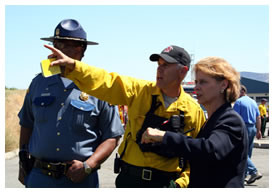
We have to be prepared and invest in our personal safety and security.”
Community Safety
Washington families should be safe and secure in their communities. Ensuring public health and safety is one of Governor Chris Gregoire’s top responsibilities. She has initiated changes that keep dangerous criminals off the streets, help communities fight crime and improve our ability to respond to emergencies. The Governor’s strategy is based on these steps:
Strengthen laws against sex offenders
Enact measures to protect the public, especially children, from sexual predators. The Governor has signed into law a number of measures that toughen sentences for sex offenders as well as protect children and teens from abuse by coaches, counselors and mentors. These measures also increase penalties for sex offenders who fail to register with the state. Law enforcement agencies now have more efficient access to sex offender records, which improves the ability of the police and schools to protect our children and vulnerable citizens.
Prevent and solve crimes
Give the State Patrol the tools it needs to prevent and solve crimes. The Governor has supported funding for new crime labs in Vancouver and Spokane. These labs help state and local police to solve crimes faster through more efficient processing of DNA samples and other evidence from crime scenes.
Fund programs that bring together neighborhoods, schools and police to steer children away from crime, prevent crime in neighborhoods and respond to crime as a community when it happens. The Governor has supported innovative approaches to crime prevention and response.
Preserve the state’s crime victim compensation program by boosting funding to meet a rising number of claims for emergency and hospital services. Among this program’s most important services is funding forensic exams for sexual assault victims, which the Governor has supported.
Prepare for natural disasters
Lead effort to address our state’s flood, earthquake, tsunami, volcano and wildfire hazards. Governor Gregoire pioneered recovery for residents and businesses in Lewis County by calling for the issuance of bonds to help low-income homeowners recover from the floods.
Initiate a six-point preparedness plan to help protect our coastal areas from a tsunami. Under the Governor’s watch, Washington installed 20 all-hazard alert broadcasting radios along the coast to warn population centers of the threat of a tsunami. New communication equipment was also installed so first responders can communicate more effectively.
Provide funds to meet the costs of fighting wildfires and retrofit 180 Washington bridges to withstand a strong earthquake. The Governor has supported investments to preserve the state’s natural resources and ensure the operability of critical infrastructure in times of disaster.
Secure our borders
Ensure efficient and safe ports that protect our economy as well as our citizenry. Washington is the most trade-dependent state and home to the third-largest container shipping center in the United States. Governor Gregoire works closely with Senator Murray and other members of our congressional delegation to pass legislation that provides adequate funding of our port security, Coast Guard and first responder programs.
-
Preserve national security and make it easier for Washingtonians to cross the border. The Governor co-chairs a new Council of Governors, created by President Obama to focus on homeland security and the National Guard. The Governor led the way to establish an enhanced driver’s license and identity card program. This program satisfies federal requirements for safety and costs less than obtaining a passport.
Targeting meth
Decrease the number of meth labs. This success has occurred through the coordinated efforts of the Governor, law enforcement, community activists, prevention specialists and treatment providers. For example, the Governor supported measures that regulate the chemicals used to produce meth.
Provide comprehensive anti-meth supports. The 2006 law supported by the Governor increased the number of drug treatment beds in prison; funded studies to determine how our state can be more effective in combating meth use; and provided local health departments with the tools necessary to protect the public and clean up contaminated meth production sites.